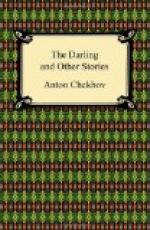I took to going to see the Voltchaninovs. As a rule I sat on the lower step of the terrace; I was fretted by dissatisfaction with myself; I was sorry at the thought of my life passing so rapidly and uninterestingly, and felt as though I would like to tear out of my breast the heart which had grown so heavy. And meanwhile I heard talk on the terrace, the rustling of dresses, the pages of a book being turned. I soon grew accustomed to the idea that during the day Lida received patients, gave out books, and often went into the village with a parasol and no hat, and in the evening talked aloud of the Zemstvo and schools. This slim, handsome, invariably austere girl, with her small well-cut mouth, always said dryly when the conversation turned on serious subjects:
“That’s of no interest to you.”
She did not like me. She disliked me because I was a landscape painter and did not in my pictures portray the privations of the peasants, and that, as she fancied, I was indifferent to what she put such faith in. I remember when I was travelling on the banks of Lake Baikal, I met a Buriat girl on horseback, wearing a shirt and trousers of blue Chinese canvas; I asked her if she would sell me her pipe. While we talked she looked contemptuously at my European face and hat, and in a moment she was bored with talking to me; she shouted to her horse and galloped on. And in just the same way Lida despised me as an alien. She never outwardly expressed her dislike for me, but I felt it, and sitting on the lower step of the terrace, I felt irritated, and said that doctoring peasants when one was not a doctor was deceiving them, and that it was easy to be benevolent when one had six thousand acres.
Meanwhile her sister Misuce had no cares, and spent her life in complete idleness just as I did. When she got up in the morning she immediately took up a book and sat down to read on the terrace in a deep arm-chair, with her feet hardly touching the ground, or hid herself with her book in the lime avenue, or walked out into the fields. She spent the whole day reading, poring greedily over her book, and only from the tired, dazed look in her eyes and the extreme paleness of her face one could divine how this continual reading exhausted her brain. When I arrived she would flush a little, leave her book, and looking into my face with her big eyes, would tell me eagerly of anything that had happened—for instance, that the chimney had been on fire in the servants’ hall, or that one of the men had caught a huge fish in the pond. On ordinary days she usually went about in a light blouse and a dark blue skirt. We went for walks together, picked cherries for making jam, went out in the boat. When she jumped up to reach a cherry or sculled in the boat, her thin, weak arms showed through her transparent sleeves. Or I painted a sketch, and she stood beside me watching rapturously.




